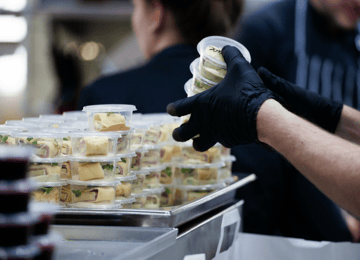For businesses in the food industry, ensuring compliance with FSMA 204 involves critical decisions about managing food safety and traceability. The choice between building a custom compliance solution or adopting a proven platform like Trustwell's FoodLogiQ can have significant implications on both operational efficiency and regulatory compliance.
The decision to build vs. buy is significant, particularly when it involves compliance with stringent food safety standards. Trustwell’s FoodLogiQ offers a compelling case for buying—cost-effectiveness, quick deployment, rigorous adherence to industry standards, and robust ongoing support. Read on to discover the pros and cons of build vs. buy.

Cost Considerations and Challenges of Building an Enterprise Solution
The cost of developing an in-house software solution for FSMA 204 compliance can be substantial. On average, businesses might expect to spend around $1.5 million to build a custom solution—a figure that includes initial development, deployment, and long-term maintenance costs. Beyond the financial outlay, the risks of project overruns and expanding budgets are considerable.
- High Initial Investment: Custom solutions demand significant upfront capital for development, testing, and deployment.
- Ongoing Maintenance Costs: Continuous updates and maintenance to address new regulations and fix bugs increase total cost of ownership.
- Risk of Project Overruns: Only 16.2% of software projects are completed on time and on budget.
Alternatively, a pre-built software solution focused on the food supply chain, like FoodLogiQ is not only ready for implementation but has already captured over 200 million Critical Tracking Events, creating a case for immediate ROI.
Building an in-house solution often means significant investment in staff, technology, and infrastructure, with costs escalating over time due to maintenance, support, and necessary innovation. Moreover, in-house systems can tie up IT resources, lead to non-standard implementations, and ultimately fail to keep pace with changing regulations and industry standards.
Time Constraints and Deployment Delays
Building a custom compliance solution is not only costly but also time-consuming. The development process—from initial design to final rollout—can take several years, which may be incompatible with the urgent compliance timelines mandated by FSMA 204 with less than two years until the FDA demands compliance.
- Long Development Cycles: Custom software development typically undergoes lengthy cycles of planning, development, and testing.
- Delay Risks: As McKinsey reports, large IT projects run 45% over budget and 7% over time, while delivering 56% less value than predicted.
- Resource Allocation: Extensive development projects can divert resources from a company’s core business activities, impacting overall business operations.
Choosing Trustwell's FoodLogiQ means gaining immediate access to the Trustwell Connect platform, facilitated by a team of customer success experts. This rapid deployment contrasts sharply with the lengthy and often delayed timelines associated with building an in-house solution.
With FoodLogiQ, companies can quickly align their operations with FSMA 204 requirements, bypassing the extended development and troubleshooting phases typical of custom-built systems.
Technical Challenges and Expertise
Developing an enterprise solution that fully meets the technical and regulatory requirements of FSMA 204 poses substantial challenges. It requires a high level of expertise, which may be beyond the current capabilities of many in-house IT teams.
- Complexity in Compliance: Ensuring that a custom solution complies with all aspects of FSMA 204 can be complex and requires specialized knowledge.
- Need for Expertise: Building a compliant platform requires experts who are not only proficient in software development but also well-versed in the specific compliance needs of the food industry.
- Integration Issues: Custom-built systems need to integrate seamlessly with existing IT infrastructure, which can be a complex and failure-prone endeavor.
With in-house experts like FSMA 204 leader Julie McGill and Rising Star of the Supply Chain, Emma Killough, Trustwell offers more than just software and brings true expertise to the table. Trustwell stands out for its commitment to ongoing support and continuous enhancement of its platform.
The dedicated customer success team ensures all user needs are met promptly, while the development team regularly introduces new functionalities. This commitment to improvement means that FoodLogiQ users always have access to the latest innovations and best practices in food safety compliance.
Future-Proofing Your Compliance Strategy
Choosing a compliance solution that not only meets current standards but can also adapt to future changes is crucial in the food industry. Trustwell’s FoodLogiQ is designed to evolve alongside the shifting landscape of food safety regulations, ensuring that your business remains at the forefront of compliance without constant reinvestment in new technologies.
- Scalability for Growing Needs: As your business grows, your compliance solutions must grow with it. Your solution should be designed to scale seamlessly with your operations, whether you're increasing production, expanding into new markets, or adding new product lines.
- Staying Ahead of Regulatory Changes: The food industry is subject to frequent regulatory changes, and keeping up can be a daunting task. Future-proofing your compliance strategy means being prepared for these changes before they happen.
Trustwell's FoodLogiQ provides a robust compliance solution that evolves with the dynamic regulations of the food industry, ensuring your business remains at the forefront without constant reinvestment. Designed to scale seamlessly with your business growth, whether through increased production, market expansion, or new product introductions, FoodLogiQ’s quarterly updates incorporate the latest features and functionalities to support your expansion and maintain compliance effortlessly.
FoodLogiQ also removes the burden of needing in-house resources to monitor regulatory changes. Our team of experts proactively ensures that each update of the platform not only aligns with current regulations but anticipates future ones as well. This strategy minimizes compliance risks and eliminates the necessity for abrupt adjustments, enabling you to focus on your core business operations with confidence in a comprehensive, future-proof compliance strategy.
Why Trustwell's FoodLogiQ?
Choosing between building an in-house solution or investing in Trustwell's FoodLogiQ is a decision that impacts not just compliance but the overall operational efficiency of your business. With its cost-effective approach, rapid deployment, continuous support, and commitment to industry standards, FoodLogiQ stands out as the optimal solution for businesses aiming to meet and surpass FSMA 204 requirements efficiently and effectively.
Opting for Trustwell's FoodLogiQ offers a strategic advantage by mitigating the risks and limitations associated with building an in-house solution.
- Proven Compliance: Trustwell’s FoodLogiQ is designed specifically to meet FSMA 204 requirements, ensuring that compliance is integrated from the outset.
- Cost-Effectiveness: With a clear pricing structure and no hidden costs, FoodLogiQ provides a predictable cost model compared to the potential financial uncertainties of custom-built solutions.
- Quick Deployment: FoodLogiQ’s ready-to-implement solution means businesses can achieve compliance swiftly, avoiding the lengthy delays associated with custom software development.
- Ongoing Support and Updates: Trustwell provides continuous support and regular updates, helping businesses stay compliant as regulations evolve.
Want to learn more?
Explore how partnering with Trustwell can transform your compliance strategy by visiting www.trustwell.com or download our quick cheat sheet “Buy Vs. Build” right here.
Ready to talk to a traceability expert? Get in touch.
Other posts you might be interested in
View All Posts
Food Industry
12 min read
| January 28, 2025
Streamline Operations with Food Specification Management: 4 Key Lessons from Trustwell’s Recent Webinar
Read More
Trustwell News
4 min read
| April 13, 2023
Salad And Go Turns to Trustwell’s FoodLogiQ Solution for Growth, Transparency, and Trust
Read More
Food Industry
5 min read
| April 18, 2023

